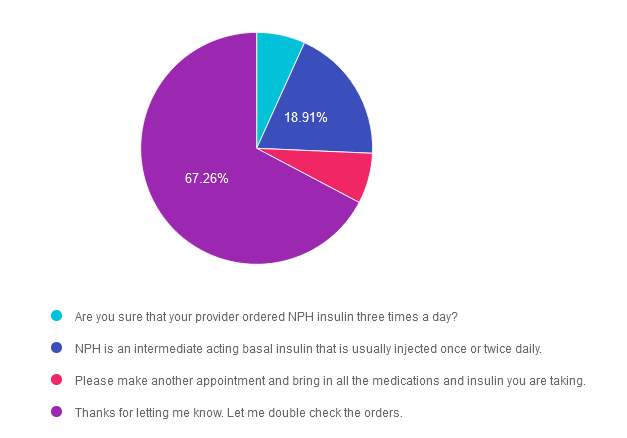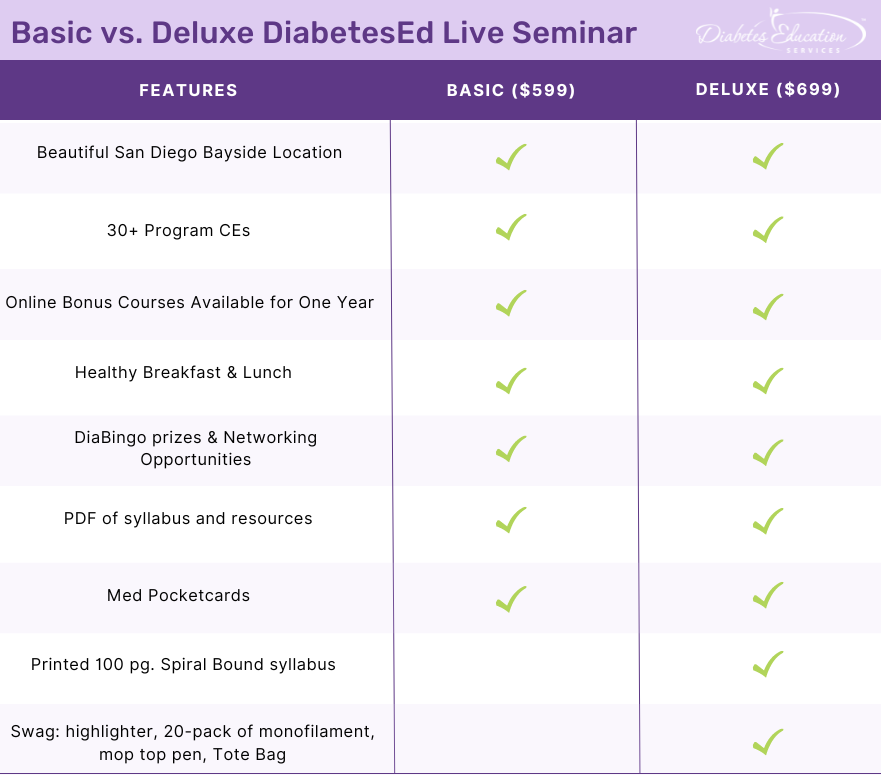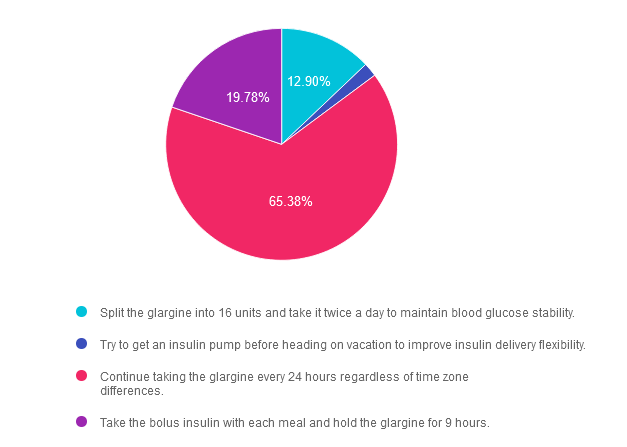
Subscribe
eNewsletter

Ready to get certified?
Free CDCES Coach App
Download
Free Med Pocket Cards

For last week’s practice question, we quizzed participants on reviewing insulin dosing adjustments. 69% of respondents chose the best answer. We want to clarify and share this important information, so you can pass it on to people living with diabetes and your colleagues, plus prepare for exam success!
Before we start though, if you don’t want any spoilers and haven’t tried the question yet, you can answer it below: Answer Question
Question: JR lives with type 1 diabetes and severe gastroparesis, despite maintaining an A1C of less than 7% for the past few years. The endocrinologist referred JR to a GI specialist, who recommended a surgical procedure called a Gastric Peroral Endoscopic Myotomy, G-POEM, to address JR’s longstanding gastroparesis.
JR asks what you think about this intervention. What is the best response?
Answer Choices:

If you are thinking about taking the certification exam, this practice test question will set you up for success. Test writers anticipate possible answers based on the details in the question. They will wave those “juicy answers” right under your nose. Your job is to weed through the particulars, pluck out the most important elements and choose the BEST answer.
Answer 1 is incorrect. 28.90% chose this answer. “It sounds like you are worried about the effectiveness and risks of this procedure. Is that right?” This tempting answer is not the best answer since JR never states that they are worried about the effectiveness of the G-POEM. Instead they just want to see what the Diabetes Care and Education Specialist thinks about this procedure. When in doubt, re-examine the key intent of the question.
Answer 2 is correct. 69.27% of you chose this answer. “Tell me more about what your GI doctor told you about this procedure.” YES, this is the BEST answer. Great job. By asking what JR knows about the procedure, we provide JR an opportunity to share their knowledge and assess areas of concern. In addition, we may let JR know that we haven’t heard of this procedure, but we will look into it.
Answer 3 is incorrect. About 0.92% of respondents chose this. “I know you are frustrated, but the primary treatment for gastroparesis is low fiber meals.” It is true that we recommend low fiber meals for gastroparesis, but JR was asking about a procedure not meal planning.
Finally, Answer 4 is incorrect. 0.92% chose this answer. “Usually, gastroparesis improves as your A1C reaches target so I would wait and see if things improve.” It is true that the stomach is better at moving its’ content forward when blood sugars are closer to target most of the time. But, sometimes, despite having an A1C on target, severe autonomic neuropathy interferes with stomach propulsion past the pyloric sphincter.
We hope you appreciate this week’s rationale! Thank you so much for taking the time to answer our Question of the Week and participate in this fun learning activity!

Coach Bev invites you to join this 60 minute webinar that covers gastrointestinal health from top to bottom. Topics include; fatty liver disease diagnosis and treatment, intestinal complications associated with diabetes, keeping the microbiome healthy, and more. Join us to explore the magnificent wonders of diabetes and the gut.
Can’t make it live? No worries. We will send post the recorded version to the Online University within 24 hours of the broadcast
Instructor: Beverly Thomassian RN, MPH, CDCES, has been Board Certified in Advanced Diabetes Management for over 20 years. She is an Associate Clinical Professor at UCSF, a working educator, and a nationally recognized diabetes expert. She has a Master’s Degree in Public Health from UCLA, with a focus on behavioral health and education.
All hours earned count toward your CDCES Accreditation Information
Sign up for Diabetes Blog Bytes – we post one daily Blog Byte from Monday to Friday. And of course, Tuesday is our Question of the Week. It’s Informative and FREE! Sign up below!
The use of DES products does not guarantee the successful passage of the diabetes certification exams. CBDCE & ADCES does not endorse any preparatory or review materials for the certification exams, except for those published by CBDCE & ADCES.

Glucose fluctuations can impact gastric emptying rates.
Which of the following is the MOST accurate statement that describes the impact of glucose levels on gastric emptying rates?
Click Here to Test your Knowledge

Coach Bev invites you to join this 60 minute webinar that covers gastrointestinal health from top to bottom. Topics include; fatty liver disease diagnosis and treatment, intestinal complications associated with diabetes, keeping the microbiome healthy, and more. Join us to explore the magnificent wonders of diabetes and the gut.
Can’t make it live? No worries. We will send post the recorded version to the Online University within 24 hours of the broadcast
Instructor: Beverly Thomassian RN, MPH, CDCES, has been Board Certified in Advanced Diabetes Management for over 20 years. She is an Associate Clinical Professor at UCSF, a working educator, and a nationally recognized diabetes expert. She has a Master’s Degree in Public Health from UCLA, with a focus on behavioral health and education.
All hours earned count toward your CDCES Accreditation Information

ADCES Hawaii Chapter & Coach Bev invite you to join this class that covers gastrointestinal health from top to bottom. Topics include; fatty liver disease diagnosis and treatment, intestinal complications associated with diabetes, keeping the microbiome healthy, and more. Join us to explore the magnificent wonders of diabetes and the gut.
Location: Honolulu Country Club, 1689 Ala Pu’umalu Street, Honolulu, HI
CEs: 6.5 CEs for physicians, nurses, pharmacists, physician assistants, dieticians & social workers.
Sign up for Diabetes Blog Bytes – we post one daily Blog Byte from Monday to Friday. And of course, Tuesday is our Question of the Week. It’s Informative and FREE! Sign up below!
The use of DES products does not guarantee the successful passage of the CDCES exam. CBDCE does not endorse any preparatory or review materials for the CDCES exam, except for those published by CBDCE.

JR is 50, has type two diabetes, and was referred to G.I. due to six months of stomach pain, intestinal, bloating, and generalized G.I. discomfort. Since they were due for their colonoscopy, the doctor also ordered an upper endoscopy to biopsy the esophagus, stomach and duodenum for any abnormalities.
The biopsy revealed that JR had moderate chronic gastritis and an H. pylori infection. JR wants to learn more about H. pylori infection.
Which of the following statements are accurate?
Click Here to Test your Knowledge

For last week’s practice question, we quizzed participants on reviewing insulin dosing adjustments. 67% of respondents chose the best answer. We want to clarify and share this important information, so you can pass it on to people living with diabetes and your colleagues, plus prepare for exam success!
Before we start though, if you don’t want any spoilers and haven’t tried the question yet, you can answer it below: Answer Question
Question: MR is 68 with type 2 diabetes and tells you that their provider increased their NPH insulin to three times a day and told them to adjust the NPH insulin dose based on their pre-meal blood sugar levels.
What is the best response?
Answer Choices:

If you are thinking about taking the certification exam, this practice test question will set you up for success. Test writers anticipate possible answers based on the details in the question. They will wave those “juicy answers” right under your nose. Your job is to weed through the particulars, pluck out the most important elements and choose the BEST answer.
Answer 1 is incorrect. 6.77% chose this answer. “Are you sure that your provider ordered NPH insulin three times a day?” This is not the best response, since it might make the individual feel like they did something wrong and put them in a defensive position.
Answer 2 is incorrect. 18.91% of you chose this answer. “NPH is an intermediate acting basal insulin that is usually injected once or twice daily.” This is a correct factual answer, but it is not the best answer since it summarizes how NPH insulin works, but doesn’t address the root of the issue or assist with problem solving.
Answer 3 is incorrect. About 7.06% of respondents chose this. “Please make another appointment and bring in all the medications and insulin you are taking.” Although “brown bagging” meds is always a good idea, this answer means that MR would continue giving NPH three times a day on a sliding scale until the next appointment is available. This delay of action could result in unstable blood glucose levels.
Finally, Answer 4 is correct. 67.26% chose this answer. “Thanks for letting me know. Let me double check the orders.” This affirmational, person centered answer is the best choice! It acknowledges MR’s concern and is followed by action to help with problem solving. GREAT JOB!
We hope you appreciate this week’s rationale! Thank you so much for taking the time to answer our Question of the Week and participate in this fun learning activity!

Can’t make it live? No worries. We will send post the recorded version to the Online University within 24 hours of the broadcast
Instructor: Beverly Thomassian RN, MPH, CDCES, has been Board Certified in Advanced Diabetes Management for over 20 years. She is an Associate Clinical Professor at UCSF, a working educator, and a nationally recognized diabetes expert. She has a Master’s Degree in Public Health from UCLA, with a focus on behavioral health and education.
All hours earned count toward your CDCES Accreditation Information
Sign up for Diabetes Blog Bytes – we post one daily Blog Byte from Monday to Friday. And of course, Tuesday is our Question of the Week. It’s Informative and FREE! Sign up below!
The use of DES products does not guarantee the successful passage of the diabetes certification exams. CBDCE & ADCES does not endorse any preparatory or review materials for the certification exams, except for those published by CBDCE & ADCES.

JR lives with type 1 diabetes and severe gastroparesis, despite maintaining an A1C of less than 7% for the past few years. The endocrinologist referred JR to a GI specialist, who recommended a surgical procedure called a Gastric Peroral Endoscopic Myotomy, G-POEM, to address JR’s longstanding gastroparesis.
JR asks what you think about this intervention. What is the best response?
Click Here to Test your Knowledge

Coach Bev invites you to join this 60 minute webinar that covers gastrointestinal health from top to bottom. Topics include; fatty liver disease diagnosis and treatment, intestinal complications associated with diabetes, keeping the microbiome healthy, and more. Join us to explore the magnificent wonders of diabetes and the gut.
Can’t make it live? No worries. We will send post the recorded version to the Online University within 24 hours of the broadcast
Instructor: Beverly Thomassian RN, MPH, CDCES, has been Board Certified in Advanced Diabetes Management for over 20 years. She is an Associate Clinical Professor at UCSF, a working educator, and a nationally recognized diabetes expert. She has a Master’s Degree in Public Health from UCLA, with a focus on behavioral health and education.
All hours earned count toward your CDCES Accreditation Information
Sign up for Diabetes Blog Bytes – we post one daily Blog Byte from Monday to Friday. And of course, Tuesday is our Question of the Week. It’s Informative and FREE! Sign up below!
The use of DES products does not guarantee the successful passage of the diabetes certification exams. CBDCE & ADCES does not endorse any preparatory or review materials for the certification exams, except for those published by CBDCE & ADCES.

For last week’s practice question, we quizzed participants on the importance of annual kidney testing. 52% of respondents chose the best answer. We want to clarify and share this important information, so you can pass it on to people living with diabetes and your colleagues, plus prepare for exam success!
Before we start though, if you don’t want any spoilers and haven’t tried the question yet, you can answer it below: Answer Question
Question: Only about 40% of individuals with diabetes get their kidney function tested annually.
Why is the evaluation of glomerular filtration rate (GFR) and Urinary Albumin Creatinine Ratio (UACR) of critical importance for people with diabetes?
Answer Choices:

If you are thinking about taking the certification exam, this practice test question will set you up for success. Test writers anticipate possible answers based on the details in the question. They will wave those “juicy answers” right under your nose. Your job is to weed through the particulars, pluck out the most important elements and choose the BEST answer.
Answer 1 is incorrect. 3.43% chose this answer. “Evaluate if peritoneal or hemodialysis is necessary for the individual.” For people experiencing chronic kidney disease and worsening kidney function, they would need their GFR and UACR checked more frequently than annually along with a referral to a kidney specialist.
Answer 2 is correct. 51.56% of you chose this answer. “Determine best anti-hypertensive and glucose pharmacotherapy.” YES, this is the best answer. Knowing the GFR and UACR is critical to determining best medication therapies. For individuals with diabetes and a GFR less than 60 and/or a UACR of 30mg/g or greater, the ADA Standards recommend starting a SGLT-2 Inhibitor to preserve renal function. In addition, in individuals with hypertension and a UACR of 30mg/g or greater, the antihypertensive of choice is either an ACE or ARB. Yearly kidney function screening helps not only direct best diabetes and hypertensive medication therapy, it also identifies early kidney disease so preventive action can be taken.
Answer 3 is incorrect. About 8.48% of respondents chose this. “Protect against immune mediated renal complications.” This juicy answer is tempting and sounds good, but it is not an accurate response or a recognized condition.
Finally, Answer 4 is incorrect. 36.53% chose this answer. “Slow the progression of chronic kidney disease development.” This answer is tempting, but it does not address the intent of the question. Yearly kidney function testing informs the care providers about the health of the kidney. but simply testing does not slow kidney disease. Action is required.
We hope you appreciate this week’s rationale! Thank you so much for taking the time to answer our Question of the Week and participate in this fun learning activity!


Join Coach Beverly and Team for two and a half days of knowledge-sharing, fun, networking, games with prizes, and “aha” moments in beautiful San Diego.
You don’t want to miss this one-of-a-kind learning opportunity. Get away from all those daily responsibilities and immerse yourself in a fun and intensive conference with plenty of networking opportunities.
Attendees will leave this conference with new tools and a more complete understanding of the latest advances in diabetes care, from medications to technology to Medical Nutrition Therapy!
Bring your colleagues and enjoy our friend discount.
Our team expertly translates the complex science of diabetes into understandable terms while keeping it real, practical, and fun.
Team of expert faculty includes:
All hours earned count toward your CDCES Accreditation Information
Sign up for Diabetes Blog Bytes – we post one daily Blog Byte from Monday to Friday. And of course, Tuesday is our Question of the Week. It’s Informative and FREE! Sign up below!
The use of DES products does not guarantee the successful passage of the CDCES exam. CBDCE does not endorse any preparatory or review materials for the CDCES exam, except for those published by CBDCE.

MR is 68 with type 2 diabetes and tells you that their provider increased their NPH insulin to three times a day and told them to adjust the NPH insulin dose based on their pre-meal blood sugar levels.
What is the best response?
Click Here to Test your Knowledge

Can’t make it live? No worries. We will send post the recorded version to the Online University within 24 hours of the broadcast
Instructor: Beverly Thomassian RN, MPH, CDCES, has been Board Certified in Advanced Diabetes Management for over 20 years. She is an Associate Clinical Professor at UCSF, a working educator, and a nationally recognized diabetes expert. She has a Master’s Degree in Public Health from UCLA, with a focus on behavioral health and education.
All hours earned count toward your CDCES Accreditation Information
Sign up for Diabetes Blog Bytes – we post one daily Blog Byte from Monday to Friday. And of course, Tuesday is our Question of the Week. It’s Informative and FREE! Sign up below!
The use of DES products does not guarantee the successful passage of the diabetes certification exams. CBDCE & ADCES does not endorse any preparatory or review materials for the certification exams, except for those published by CBDCE & ADCES.

For last week’s practice question, we quizzed participants on living with diabetes & traveling to different timezones. 65% of respondents chose the best answer. We want to clarify and share this important information, so you can pass it on to people living with diabetes and your colleagues, plus prepare for exam success!
Before we start though, if you don’t want any spoilers and haven’t tried the question yet, you can answer it below: Answer Question
Question: BT is heading to the south of France for a 25th wedding anniversary vacation. They usually take 32 units of glargine at 10 PM each night along with 5-7 units of bolus insulin with meals. There is a nine hour time difference between the United States and France.
They ask you how to adjust their basal insulin. What is the best response?
Answer Choices:

If you are thinking about taking the certification exam, this practice test question will set you up for success. Test writers anticipate possible answers based on the details in the question. They will wave those “juicy answers” right under your nose. Your job is to weed through the particulars, pluck out the most important elements and choose the BEST answer.
Answer 1 is incorrect. 12.90% chose this answer. “Split the glargine into 16 units and take it twice a day to maintain blood glucose stability.” Although a tempting answer, this action does not address or solve the issue of determining insulin injection timing in a different time zone.
Answer 2 is incorrect. 1.94% of you chose this answer. “Try to get an insulin pump before heading on vacation to improve insulin delivery flexibility.” This approach offers too big of an intervention based on BT’s question of when to dose their insulin in a different time zone.
Answer 3 is correct. About 65.38% of respondents chose this. “Continue taking the glargine every 24 hours regardless of time zone differences.” YES, GREAT JOB. Sometimes the most direct and simplest answer is the best answer. While traveling across time zones, as long as BT takes the basal insulin about every 24 hours and the bolus insulin with meals, they will be able to maintain their usual approach. However, accurate carb counting for French pastries and three course meals is a whole different challenge. : -)
Finally, Answer 4 is incorrect. 19.78% chose this answer. “Take the bolus insulin with each meal and hold the glargine for 9 hours.” The first part of this answer is correct, but the second part isn’t really accurate and it is too vague and confusing to make this answer the best choice. This is a great example of a “juicy answer”.
We hope you appreciate this week’s rationale! Thank you so much for taking the time to answer our Question of the Week and participate in this fun learning activity!


Join Coach Beverly and Team for two and a half days of knowledge-sharing, fun, networking, games with prizes, and “aha” moments in beautiful San Diego.
You don’t want to miss this one-of-a-kind learning opportunity. Get away from all those daily responsibilities and immerse yourself in a fun and intensive conference with plenty of networking opportunities.
Attendees will leave this conference with new tools and a more complete understanding of the latest advances in diabetes care, from medications to technology to Medical Nutrition Therapy!
Bring your colleagues and enjoy our friend discount.
Our team expertly translates the complex science of diabetes into understandable terms while keeping it real, practical, and fun.
Team of expert faculty includes:
All hours earned count toward your CDCES Accreditation Information
Sign up for Diabetes Blog Bytes – we post one daily Blog Byte from Monday to Friday. And of course, Tuesday is our Question of the Week. It’s Informative and FREE! Sign up below!
The use of DES products does not guarantee the successful passage of the diabetes certification exams. CBDCE & ADCES does not endorse any preparatory or review materials for the certification exams, except for those published by CBDCE & ADCES.